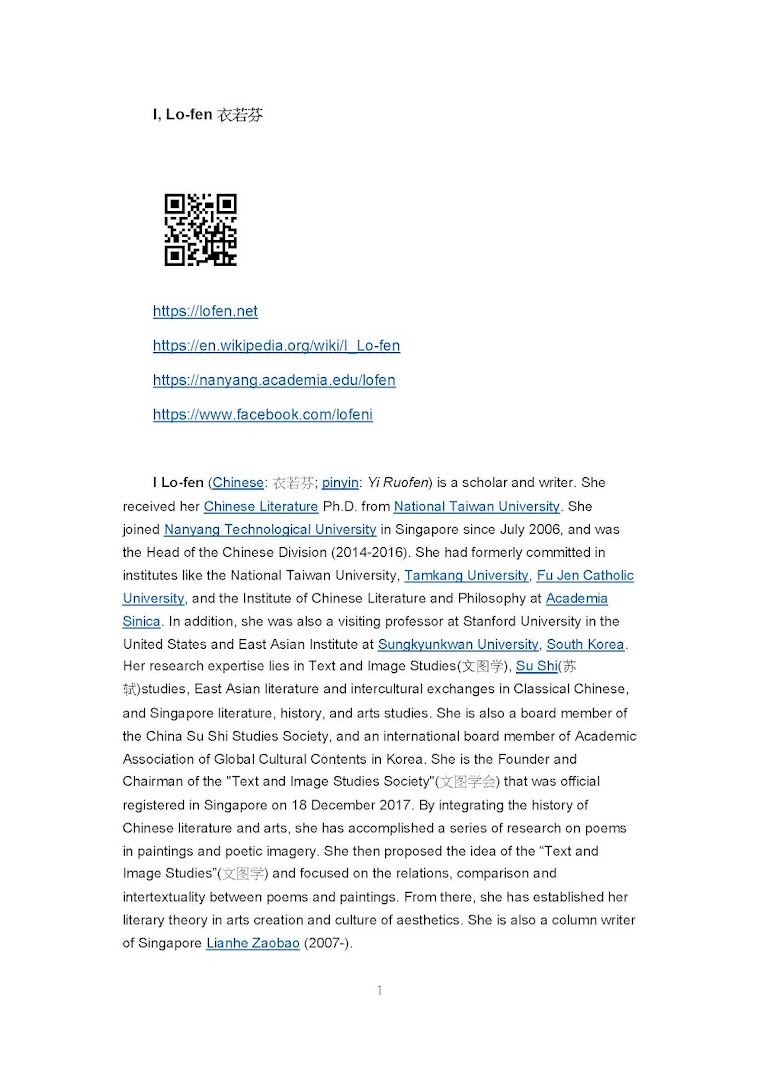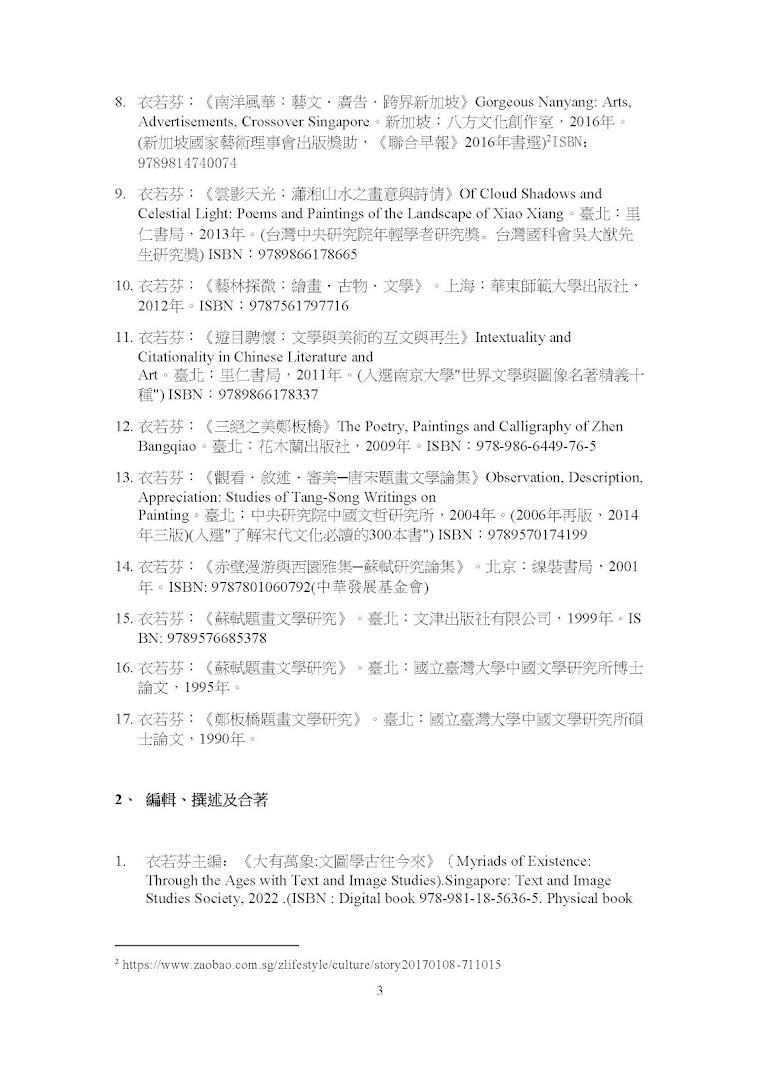我们还要读大学吗? Do We Still Need to Go to College?
衣若芬
你适合读大学吗?大学毕业还需要为了学历继续考研,读硕士、博士吗?
比起孔子的“十有五而志于学”,这是较为合乎当代现状,舒缓困境的建议,一个35年大学老师的经验总结。
这篇文章写给迷惘中的你,欢迎各级老师们参考指教。
***
在新加坡宽敞舒适的电影院,观赏自己中学时畅销小说改编的台湾电影修复旧片以后,全球首映,是一种怎样的心情?
已经知道新加坡电影协会主席陈继贤先生14岁时被《拒绝联考的小子》启发,不但连看了43遍,还影响一生的兴趣志业。所以亲自到新加坡出席首映场的徐进良导演动情地说:“世界的电影奖项都忘了,最重要的不是男女主角,最重要的是最佳观众!”
是的,观众,读者,我们何其有幸,能在浩瀚烟海中巧遇那提点方向的光亮!
在录取率只有30%左右的1970-1980年代,台湾的高中生如果没考上大学,还不如初中毕业就报读职业学校,习得一技之长。吴祥辉,台北市顶尖学校的高材生,毅然挑战社会的集体价值观,坚决贯彻个人不依赖学位文凭的行为,比他晚生10年的我,不仅佩服他放弃参加大学入学考试的勇气,还有他开阔的思维,走上自我掌控的道路。
老师们都担心连锁效应,要我们持续关注吴祥辉的发展。想一想,如果你也学他不考大学,会有怎样的“下场”?记得那时他从事电影工作,我有一些些羡慕,我从小写作,觉得写作人除了文字,最好还能擅长图像创意,尤其是蓬勃的影视产业。
1983年7月29日,台湾的报纸夹页刊登了录取大学新生的榜单,我的名字在第一页台湾大学中文系。苦读一个月侥幸挤进梦寐以求的窄门,在42年以后,台湾的大学甄选入学分发率超过50%,加上考试入学的管道,大学生已经在同年龄层人口中不再是稀罕的佼佼者。于是出现了“学历贬值”的说法。
维珍集团的大亨理查·布兰森(Richard
Branson)没读过大学;史蒂夫·乔布斯(Steve
Jobs)、比尔·盖茨(Bill
Gates)等人也都中途辍学;再加上近年来AI界“英雄出少年”的杰出代表,比如设计协作平台,深度集成AI设计工具Figma的创办人Dylan
Field,布朗大学休学;AI训练数据处理平台Scale
AI 创办人兼
CEO Alexandr Wang(汪滔),麻省理工学院休学, 似乎有点想法和才能的人,不必在大学浪费时间和金钱了!
何况,懂得使用AIGC(人工智能生成)工具的话,编程、文案、画图、演唱,乃至于动画影片都可以无师自通,上手比大学老师还快速顺畅。所谓的“一人公司”的创业风潮正在兴起,与其等毕业以后被选入职场社会,何不直接冲进战场,打下江山?
我曾经参考马云对于生涯规划的看法,归纳出我的阶段式成长建议:
在幼儿园时期,重点在培养热爱学习的习惯,阅读、动手操作,回应好奇心。
小学时期,重点在教育健全人格,认识我是谁,肯定自己存在的意义。
中学时期,重点在认识社会规范,区分我和他人的行为边界,涵括法律常识。
初级学院/高中时期,重点在明瞭和掌握、扩充自己的兴趣和能力,画出未来安生立命的基本蓝图。
如果就读理工学院,就要针对职场需求,训练专业技能。并非每个人都必须读大学,能够具备职业技能,而且时间和金钱都比较拮据的人,调整心态,适应环境,希望从工作中获得满足。即使不读大学,也要像儿童一样保持热爱学习的习惯,终身不休。
至于大学,应该从课程中建立系统知识结构、负责任的观念,独力或协作解决问题的方法。也就是说,除了专业技术,还要有支撑技术,可复制、迁移、迭代、优化的框架、模型、原则、理论。
假使还想深造,追求更高教育,硕士研究生是对现有/大学时形塑的知识体系加以深化、重整、巩固,思考未来的可行性。
继续拓展对世界的认知,从个案到宏观的视野,进而发现或发明思想,建构被认同的学术论述,就要攻读博士了。
那些没有读大学,没有完成学业的成功人士很了不起,但是其中是否隐含“幸存者偏差”呢?大学文凭只是进入某个圈层的入场券,有的人扫二维码;有的人—扫脸。
2025年8月30日,新加坡《联合早报》“上善若水”专栏
Do
We Still Need to Go to College?
I Lo-fen
Are You Suited for College?
Do you still need to pursue a master’s or
doctoral degree after graduating from university, just for the sake of
obtaining higher qualifications?
Compared with Confucius’ saying “At
fifteen, I set my heart upon learning,” this is advice that better fits today’s
reality and helps ease present dilemmas—an experience-based reflection from a
university teacher of 35 years.
This article is written for you, who may
be feeling lost, and I also welcome teachers at all levels to read, reflect,
and offer your guidance.
***
What kind of feeling is it to sit in a
spacious, comfortable cinema in Singapore, watching the restored version of a
Taiwanese film adapted from a bestselling novel of my secondary school days,
now having its world premiere?
I had already learned that Mr. Tan Gee
Hian, President of the Singapore Film Society, was so inspired at age 14 by The
Fellow Who Rejected College that he watched it 43 times, and it went on to
shape his lifelong passions and career. Thus, when director Hsu Chin-liang
attended the premiere in Singapore in person, he was deeply moved and said: “Forget
all the world’s film awards. The most important is not Best Actor or Best
Actress—it’s Best Audience!”
Indeed, the audience, the readers—we are
so fortunate to encounter, amid the vast ocean of existence, that glimmer of
light which points us in the right direction.
In Taiwan of the 1970s and 1980s, when the
university admission rate hovered around 30%, high school students who failed
to enter university would have been better off enrolling straight into
vocational schools after junior high, in order to master a trade. Wu
Hsiang-hui, a top student from one of Taipei’s elite schools, boldly challenged
the collective values of society, resolutely acting out a life not dependent on
degrees or diplomas. As someone ten years younger, I not only admired his
courage in giving up the college entrance exam, but also his broad-mindedness
in walking a path of self-mastery.
Teachers, worried about a chain reaction,
urged us to keep following Wu’s development. Just imagine—if you, too, refused
to go to college, what “fate” would await you? I recall that he entered the
film industry then, which I somewhat envied. Since childhood, I had been
writing, and I felt that writers, apart from words, ought also to excel in
visual creativity—especially in the flourishing film and television industry.
On July 29, 1983, Taiwan’s newspapers
carried the list of new university entrants. My name appeared on the very first
page, under National Taiwan University’s Department of Chinese. After a month
of grueling study, I had squeezed through the narrow gate of my dreams.
Forty-two years later, however, Taiwan’s university admission rate through
recommendation and selection has already exceeded 50%, and with exam-based
admissions as well, university students are no longer rare elites among their
peers. Thus arose the saying: “academic degrees are devalued.”
Richard Branson, tycoon of Virgin Group,
never went to college; Steve Jobs and Bill Gates both dropped out; in recent
years, the AI world has produced brilliant young heroes—such as Dylan Field,
founder of design collaboration platform Figma with its deeply integrated AI
design tools, who dropped out of Brown University; and Alexandr Wang, founder
and CEO of AI training data platform Scale AI, who left MIT. It would seem that
if you have ideas and talent, there is no need to waste time and money in college!
Moreover, with skill in using AIGC
(AI-generated content) tools, one can teach oneself to code, write copy, draw,
sing, and even make animated films—often faster and more smoothly than
university professors. The trend of “one-person companies” is rising. Instead
of waiting until graduation to be chosen by society, why not rush straight onto
the battlefield and carve out your own kingdom?
I once reflected on Jack Ma’s views about
career planning and summarized them into my own stage-based growth advice:
· Kindergarten
years: cultivate a love for learning—reading, hands-on
exploration, satisfying curiosity.
· Primary
school years: develop sound character—know who I am, affirm the
meaning of my existence.
· Secondary
school years: understand social norms—draw boundaries between
my behavior and others’, including basic legal awareness.
· Junior
college / high school years: clarify, expand, and strengthen my
interests and abilities—sketch the blueprint for future livelihood.
· Polytechnic
years: train professional skills tailored to workplace
needs.
Not everyone must go to university. Those
with vocational skills, or with limited time and financial resources, can
adjust their mindset, adapt to their environment, and seek fulfillment through
work. Even if you do not attend college, you should keep, like a child, the
habit of loving learning—lifelong, without pause.
As for university, its purpose should be
to build a systematic knowledge structure, a sense of responsibility, and
methods to solve problems independently or collaboratively. In other words,
beyond specialized skills, one must have the supporting frameworks—replicable,
transferable, iterative, optimizable models, principles, and theories. If one
wishes to pursue further education, a master’s degree deepens, reorganizes, and
consolidates the knowledge system formed in college, while thinking about
future feasibility. A doctoral degree, then, is to expand understanding of the
world, from case studies to a macro vision, to discover or invent ideas, and to
construct academically recognized discourse.
Those successful individuals who never
attended or finished college are remarkable—but does this not conceal a kind of
“survivorship bias”? A university diploma is merely a ticket into a certain
circle. Some scan QR codes; some—scan their faces.
August 30,
2025, Singapore Lianhe Zaobao, “Shang Shan Ruo Shui” column












沒有留言:
張貼留言